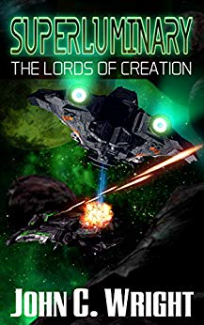 John C. Wright’s Superluminary: The Lords of Creation, recently published by Castalia House, makes most space opera look like space community theater.
John C. Wright’s Superluminary: The Lords of Creation, recently published by Castalia House, makes most space opera look like space community theater.
In a single lifetime, the solar system flourishes from dead planets, save our precious Earth, to a multitude of worlds. Each major planet, worldlet, moon, and most of the larger satellites of the sun, serves as the private realm of one of the Lords of Creations – near gods made so by the technology created by their father. The children of the Lords of Creation number nine, with hundreds more grandchildren. Each of whom commands a satellite their own, complete with a riot of bio-engineered variations of mankind. Using Grandfather’s advanced technology, they have recreated the solar system, and mankind, each according to his or her own designs. Despite the near-magic levels of power these post-postmodern godlings commands, they are imprisoned with their home solar system by the iron clad laws of physics and the unbreakable barrier of the speed of light.
The larger than life personalities and larger than life settings provide some amusement for the Lords of Creation, but the constraints even they face set the stage for conflicts over how best to rule their tiny corner of the universe, and how best to find the ultimate secret technology taken to the grave by their all-powerful Grandfather, and whether or not such technology is even worth pursuing. The end result is a tale both epic in scale and as petty as any family squabble. The family political drama keeps the story grounded enough to follow.
The inspiration for Superluminary shines through in every page. The family squabbles are reminiscent of Zelazny’s Amber Chronicles, with the parallel world conceit replaced by space-faring and planetary scale-terraforming, and without the dated 1970s slang and ubiquitous smoking. The phenomenal amounts of power casually tossed around the story harken back to the best of Doc E. E. Smith’s Lensman, with the wristband Lenses and Arisian uplifting of mankind replaced by individual AI signet rings and Grandfather’s tech. The blending of the two styles works seamlessly to create something wonderfully new, and uniquely wild and unpredictable.
Instead of true woo-woo magic, the power of the Lords of Creation follows rigorous rules of tech that generally extrapolates from today’s technology. How plausible the explanation behind the technology might be is an exercise left to the reader. References to closed timelike curves, gravity-differential turbines, subcutaneous bioadamantium armor, nano-neural broadcast cells, weaponized super-noveas, planetary cores turned into space lasers, and space-contortion pearls litter the text, providing just enough of a handle to provide verisimilitude without getting in the way of the action.
But all of this set dressing means nothing without breathing characters striding across the stage. Wright delivers those and to spare. He throws the reader into an assassination attempt on the youngest member of the family of the gods, Aeneas. This betrayal by a trusted comrade of the youngest member of the family of near-gods, by a mere mortal who would steal Aeneas’ own powers rather than aid him in his quest to overthrow the Lords and return the rule of democracy to humanity, drags the action from the palace at the top of Mount Everest to the wind-swept frigid wastes of Pluto. We learn of the factions within the family, each of the nine children of Grandfather ruling one of the nine planets with Grecian trappings, and struggle along with Aeneas to deduce who can be trusted to serve mankind and who is only out for him or herself. Spoilers – it’s mostly the latter.
It goes without saying that the writing is fantastic – this is John C. Wright we’re talking about here – so let’s close with an odd sort of left-handed complement. The Lords of Creation is short. It gets in there, throws you in the deep end of this massive setting, shakes you around a bit, and then just after resolving a major threat to life in the universe, it ends with a cliffhanger that leaves you satisfied with book one and eager to move on to book two – The Space Vampires.
Or, you can purchase the paperback omnibus of the Superluminary series from the Castalia House Direct storefront.
“Superluminary: The Lords of Creation… makes most space opera look like space community theater.”
Now THAT is a definite keeper. JCW should put that in a blurb.
OK, Mollison, you sold me. Where the hell I’ll find the time to also squeeze THIS book in there with the rest, I dunno.
SUPERLUMINARY is the real thing. The cosmic-scale superscience reminded me of the Arcot, Morey and Wade series, which was John W. Campbell’s attempt to one-up Doc Smith.
-
Well, we know JCW is a big fan of AE van Vogt as well. This book sounds like it has all the right ingredients.
From what I’ve read about it, this would seem spot on:
“The family squabbles are reminiscent of Zelazny’s Amber Chronicles…”
However, I would also say that here seems to be more than a whiff of Zelazny’s LORD OF LIGHT as well. Jagi Lamplighter recently spilled the beans about how she and her husband are huge Zelazny fans. A damned good thing, in my book. Zelazny was easily one of the best SFF authors to come out of the ’60s.
This summary smells a lot like the RPG Traveller secret of the ancients.
Superluminary was a 52-week serial at first. Quite interesting, and quite strange. When Wright takes a flight of fancy, it’s not merely to the next state over. This is one of his periodic attempts to try to inherit the mantle of world-wrecker from Edmond Hamilton.
Is Castalia going to publish the e-book of this series from their own site in the near future?